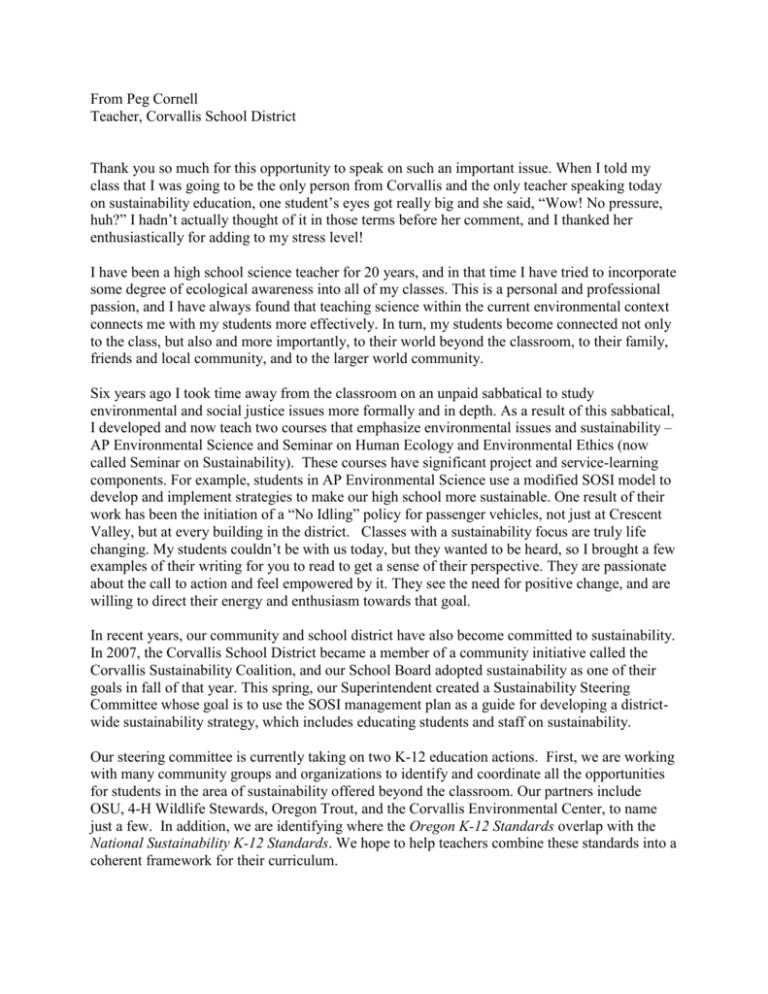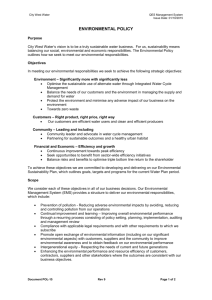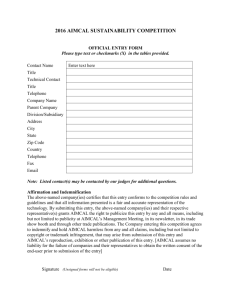Cornell Letter - Oregon Department of Education
advertisement

From Peg Cornell Teacher, Corvallis School District Thank you so much for this opportunity to speak on such an important issue. When I told my class that I was going to be the only person from Corvallis and the only teacher speaking today on sustainability education, one student’s eyes got really big and she said, “Wow! No pressure, huh?” I hadn’t actually thought of it in those terms before her comment, and I thanked her enthusiastically for adding to my stress level! I have been a high school science teacher for 20 years, and in that time I have tried to incorporate some degree of ecological awareness into all of my classes. This is a personal and professional passion, and I have always found that teaching science within the current environmental context connects me with my students more effectively. In turn, my students become connected not only to the class, but also and more importantly, to their world beyond the classroom, to their family, friends and local community, and to the larger world community. Six years ago I took time away from the classroom on an unpaid sabbatical to study environmental and social justice issues more formally and in depth. As a result of this sabbatical, I developed and now teach two courses that emphasize environmental issues and sustainability – AP Environmental Science and Seminar on Human Ecology and Environmental Ethics (now called Seminar on Sustainability). These courses have significant project and service-learning components. For example, students in AP Environmental Science use a modified SOSI model to develop and implement strategies to make our high school more sustainable. One result of their work has been the initiation of a “No Idling” policy for passenger vehicles, not just at Crescent Valley, but at every building in the district. Classes with a sustainability focus are truly life changing. My students couldn’t be with us today, but they wanted to be heard, so I brought a few examples of their writing for you to read to get a sense of their perspective. They are passionate about the call to action and feel empowered by it. They see the need for positive change, and are willing to direct their energy and enthusiasm towards that goal. In recent years, our community and school district have also become committed to sustainability. In 2007, the Corvallis School District became a member of a community initiative called the Corvallis Sustainability Coalition, and our School Board adopted sustainability as one of their goals in fall of that year. This spring, our Superintendent created a Sustainability Steering Committee whose goal is to use the SOSI management plan as a guide for developing a districtwide sustainability strategy, which includes educating students and staff on sustainability. Our steering committee is currently taking on two K-12 education actions. First, we are working with many community groups and organizations to identify and coordinate all the opportunities for students in the area of sustainability offered beyond the classroom. Our partners include OSU, 4-H Wildlife Stewards, Oregon Trout, and the Corvallis Environmental Center, to name just a few. In addition, we are identifying where the Oregon K-12 Standards overlap with the National Sustainability K-12 Standards. We hope to help teachers combine these standards into a coherent framework for their curriculum. I am here today because these actions, as exciting as they are, are simply not enough. There must be a coordinated statewide K-12 initiative if we truly expect to make sustainability education sustainable. I am asking for your help to establish a statewide commitment to sustainability education. We absolutely need grassroots level interest and commitment, but we also need a commitment from policy makers at the highest level in order to make this happen. One place where commitment must occur is in the standards that every teacher is required to teach, and that every teacher uses as they make adjustments to their curriculum. I was greatly disheartened by the fact that the word “sustainability” appears in the recently adopted state science standards only one time, and not until the high school level. The concept of sustainability needs to be articulated and emphasized earlier. This is not just my opinion; this is what I hear year after year from my juniors and seniors. When they ask me, “Why haven’t we heard about these issues before?” I don’t have a good answer for them. We must teach our students to be future-thinkers, to consider the long-term results of actions we take today. The majority of students will not have a career in science or natural resources, but they will all be inhabitants of the earth. Every student will be a consumer and every student will have an impact on the planet. The reality is that young people are constantly exposed to messages from a variety of sources that promote unsustainable consumerism and other practices. Unless we integrate instruction in sustainability throughout the entire educational experience, ecologically unsound practices will continue into the future. It is our responsibility to prepare students for the environmental realities that exist, and for the career opportunities that await them. More and more colleges and universities are incorporating sustainable practices and procedures and are offering degrees in sustainability-related fields. In order to prepare students for post-secondary education, we must more systemically address sustainability in K-12 education. Just imagine what the world could be like if, as a result of our efforts in every school district around the state, every graduating senior is exposed every year to teachers, administrators, school board members and other staff who are actively and visibly committed to sustainable practices. Imagine teachers who incorporate sustainability into their daily lessons and model sustainable practices in their classrooms. Imagine administrators who recycle and walk or bike to school. Imagine cafeteria food that is organic and locally grown, a lot of it by the students on the school campus. Imagine students riding on school buses that run on biodiesel or are hybrids, and playing tag on grounds that are watered using a rainwater-harvesting system. Imagine that, as a result of all of these small acts seen for years at their schools, students make a commitment to live in a sustainable way regardless of the career path they choose. Imagine the impact on their lives, on their families and friends, on their careers, on other human populations, on other species and on the planet as a whole. Imagine! To paraphrase a former teacher of the year, “Children are not vessels to be filled, instead they are candles to be lit”. Imagine what a bonfire of positive change for the planet our students could start if we give them the chance!








